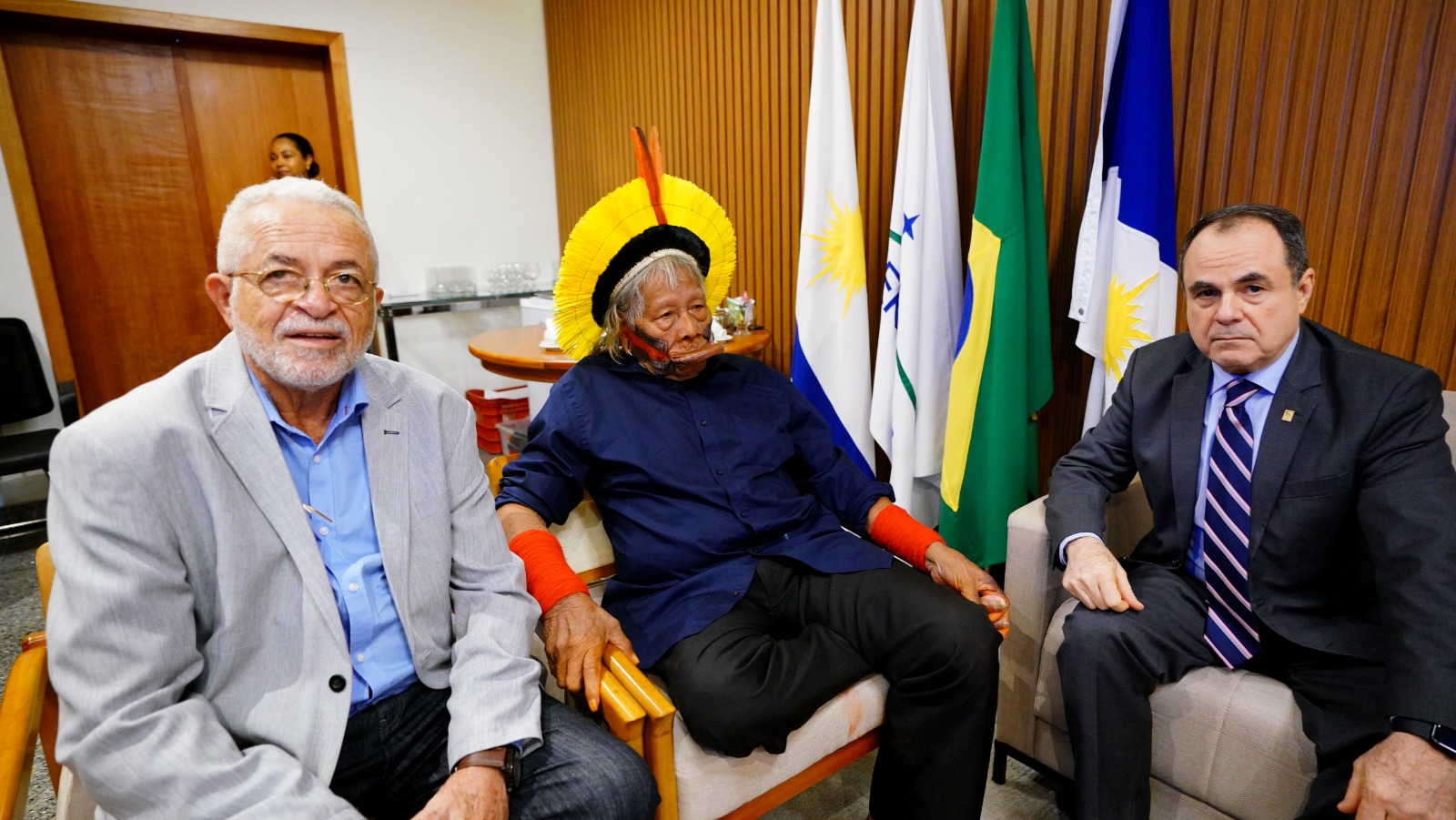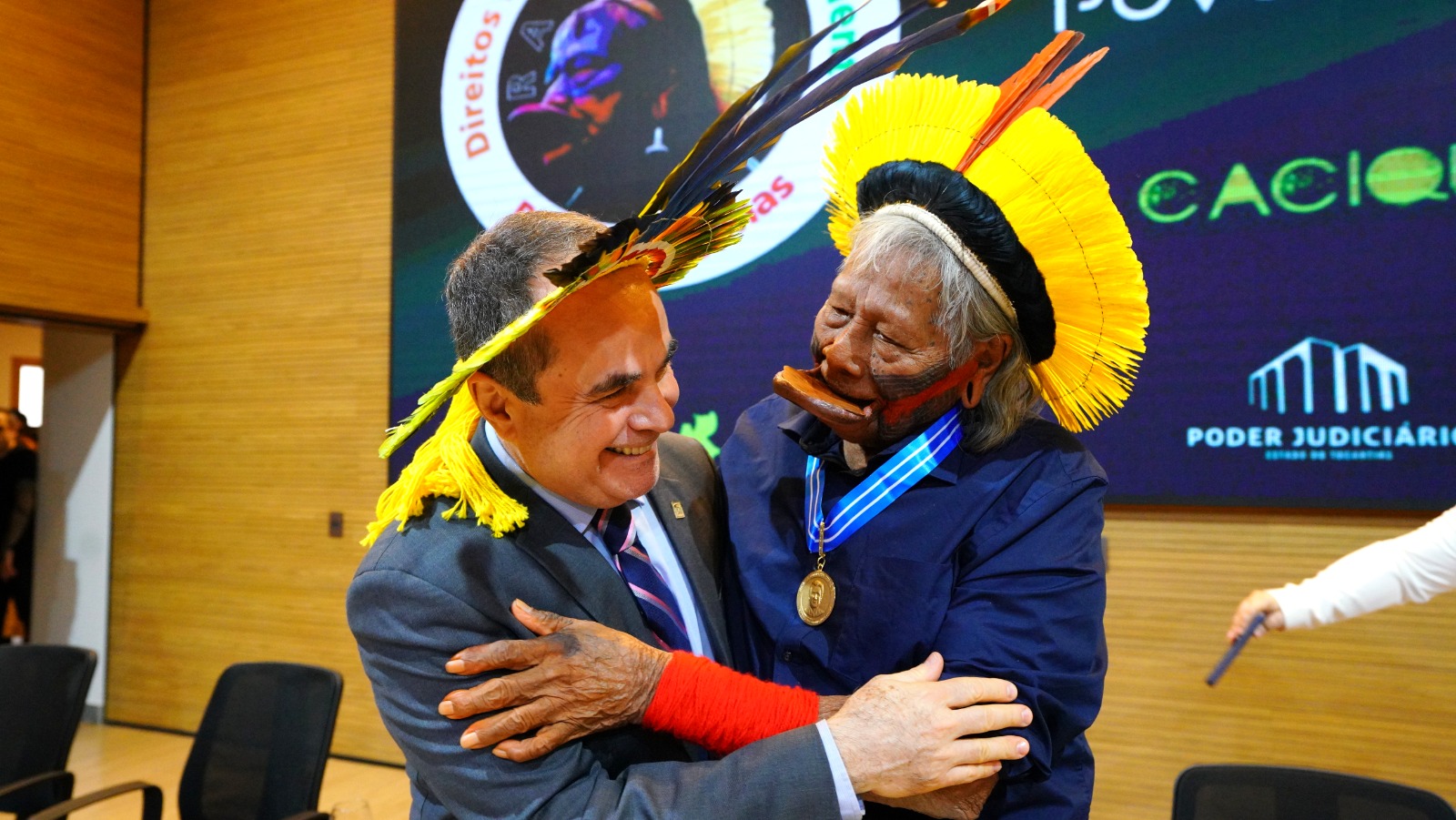
The Journal of Tocantins published an article on Thursday (May 23rd) highlighting the visit of Chief Raoni to the State, where he gave a lecture at the Court of Justice of the State of Tocantins (TJTO) on “Human Rights, the Environment and Indigenous Peoples”. As well as sharing his ancestral wisdom, Raoni brought a new historical interpretation of the origin of the name Tocantins, surprising Justice Marco Villas Boas, General Director of the Superior School of the Judges of the State of Tocantins (Esmat).
Check it out:
The visit of Chief Raoni to the State of Tocantins left a trail of light that will not fade. As well as his knowledge of public policies for social inclusion and the protection of indigenous peoples and traditional populations, he left behind knowledge of the history of the State of Tocantins that surprised Justice Marco Villas Boas and the state secretary for Culture, Tião Pinheiro, members of the Academy of Letters of the State of Tocantins (ATL) and scholars of traditional peoples, culture and the history of the State of Tocantins.
At the invitation of the Superior School of the Judges of the State of Tocantins (Esmat), headed by Justice Marco Villas Boas, Raoni gave a lecture on “Human Rights, the Environment and Indigenous Peoples” last Tuesday (May 21st), in the Auditorium of the Court of Justice of the State of Tocantins, which was filled with indigenous people, people and authorities from the Judiciary and the Executive.
Before the event began, Raoni told the two of them that he had heard from his father, who had also heard from his grandfather, that the Kaiapó occupied the territory where the State of Tocantins and its capital, Palmas, are located, but because of clashes with Europeans, they were forced to seek refuge beyond the Araguaia River. So, added the Chief, the indigenous people of the State of Tocantins are our close relatives.
Justice Villas Boas thanked Raoni for writing another page in the history of the people of the State of Tocantins and for clarifying the mistake spelled out in the annals of the history of the State, since scholars had believed that the place name Tocantins referred to the indigenous people known as “tucantins”, which means “nose of toucan”. According to the Kaiapó ancestral report, the name Tocantins is a phonetic mutation of “kokaty” (cocati), which means Rio Grande (Big River).
Doctorate
Twelve years ago, Justice Marco Villas Boas began researching indigenous peoples and the environment. He defended his master's thesis in Constitutional Law at the University of Lisbon in 2014, on the subject of “Indigenous socio-environmentalism in the Brazilian Constitution”, arguing that there is perfect harmony between indigenous peoples and environmental protection and that indigenous lands and traditional practices and knowledge have ecological value.
He then began his doctoral research on the same subject with continental projection, at the same University; this time, in the doctorate in Legal and Political Sciences, defending his thesis on “The ecological dimension of indigenous self-determination in American Constitutions” in 2021, in which he analyzed the evolution of the protection of indigenous rights based on the protection of the environment on the American continent.
In 2020, Justice Marco Villas Boas undertook a new research on the subject, now focused on the continental Amazon, in which he investigated the possibility of setting up mosaics of protected areas, made up of conservation units and indigenous lands and with integrated management shared with indigenous peoples, which could be a possibility for improving environmental protection in the Amazon and promoting the fundamental rights of forest peoples. The latter has a doctorate in Constitutional Law from PUC in the State of Rio de Janeiro.
For Villas Boas, “more important than the development of this academic thesis and the publication of several scientific articles in international journals and conferences at universities in Brazil and abroad is the practical result, with the implementation of the Program for the Socio-Political Inclusion of the Indigenous Peoples within the scope of the Electoral Court, while I was in charge of the General Internal Affairs and Presidency. The project had the academic and institutional support of the Superior School of the Judges of the State of Tocantins and the coordination of Judge Wellington Magalhães.”
In 2020, Villas Boas presented the program at the United Nations Assembly (ILANUD) in Quito-Ecuador, where it was approved by acclamation and recommended as a public policy for valuing and promoting the rights of the indigenous peoples. In 2023, the program institutionalized in the Regional Electoral Court (TRE-TO) won first place in the national award promoted by the Superior Electoral Court (TSE).
“The dialogue with the indigenous peoples was started in 2011 by myself, Wellington Magalhães and the Public Prosecutor Álvaro Manzano. Together, we visited all the indigenous lands in the State to talk to the leaders,” he says.
Strengthening Voices
Last Wednesday (May 22nd), at the TRE-TO, in the city of Palmas, the practical results of the program were shown during the event “Strengthening Voices: Evaluation meeting of political education actions in indigenous communities” with the presence of Justice João Rigo Guimarães, President of the court; Justice Silmar Fernandes, President of the TRE of the State of São Paulo; Judge José Maria Lima, General Coordinator of the permanent programs of the TRE-TO; electoral Judge Eustáquio de Melo, coordinator of the program for the Socio-political Inclusion of Indigenous Peoples; Judge Wellington Magalhães, head of the 3rd Deputy Board of the Council for High Studies and Scientific Research of the Superior School of the Judges of the State of Tocantins (Esmat); Narubia Werreria Karajá, Secretary of the Original Peoples of the State of Tocantins; and Tião Pinheiro, Secretary of Culture of the State of Tocantins.
Source: Journal of Tocantins.




_thumbnail_thumbnail.jpeg)
_thumbnail_thumbnail.jpeg)
_thumbnail_thumbnail.jpeg)
_thumbnail_thumbnail.jpeg)
_thumbnail.jpeg)
_thumbnail.jpeg)
_thumbnail.jpeg)
_thumbnail.jpeg)
